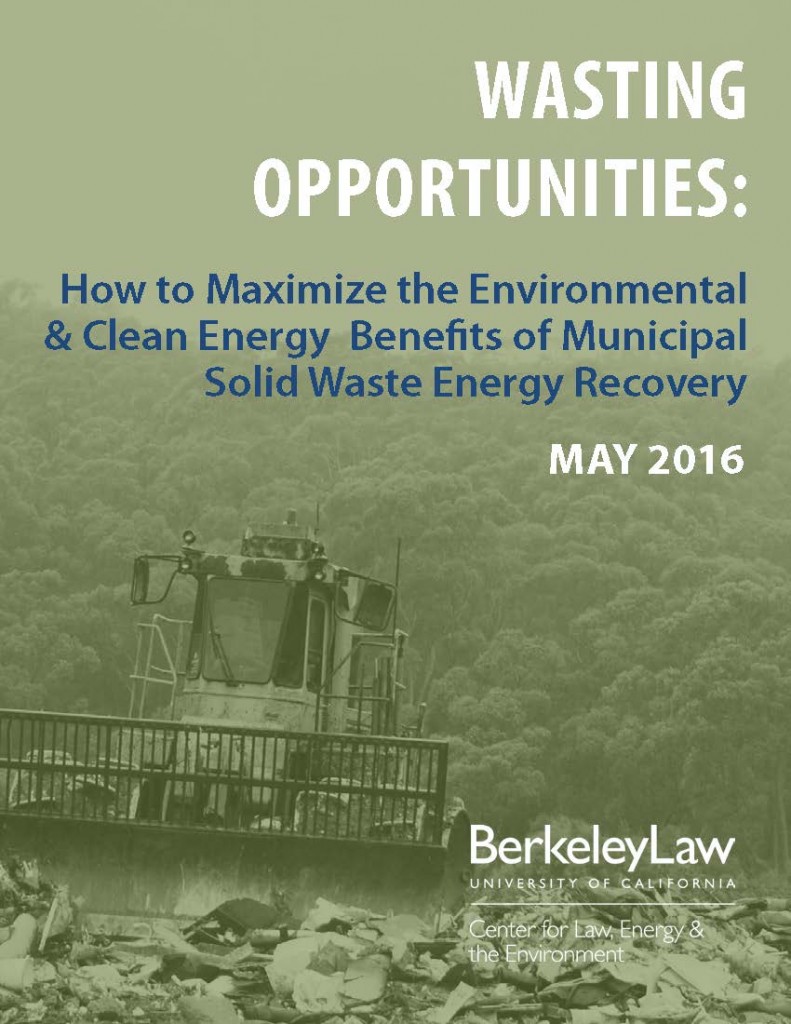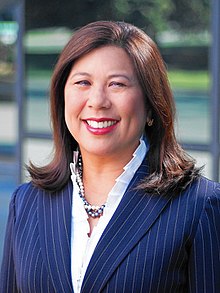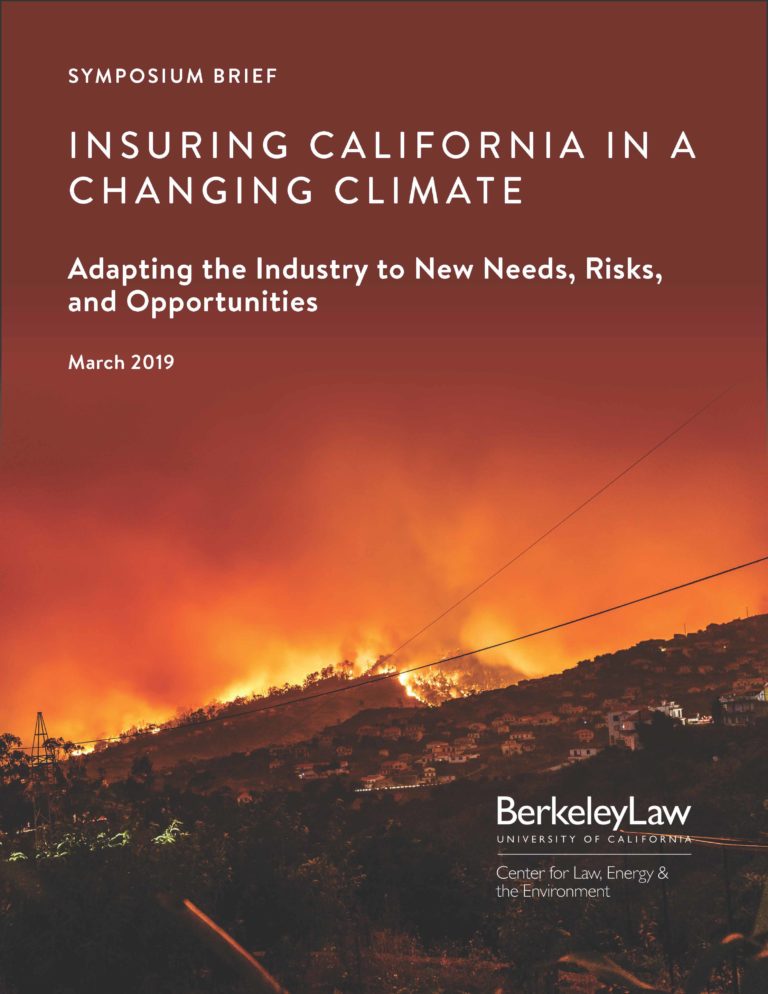Los Angeles mayor Eric Garcetti made headlines recently by unveiling the city’s version of a “Green New Deal,” complete with ambitious goals to create a zero-emission transportation network, a zero-carbon electricity grid, and a Los Angeles that “won’t send a single piece of trash” to the landfill by 2050.
The goals in the new sustainability plan [PDF] are necessary to meet our environmental and sustainability needs, but how can the city make them feasible to achieve?

I discussed the zero-waste goal in particular on KPCC radio’s AirTalk program, along with my UCLA Law colleague Cara Horowitz. My comments were drawn largely from the 2016 CLEE report “Wasting Opportunities” on boosting energy recovery from municipal solid waste to meet climate goals.
The bottom line? Achieving zero waste will require significant reduction of materials in use, increases in recycling and composting, and — yes — some type of energy recovery from whatever is left over. You can listen to the broadcast here.

Join Berkeley Law’s Center for Law, Energy and the Environment (CLEE) and the European Union for a roundtable discussion “From Brussels to the Bay” on regulatory developments in sustainable finance and responsible investment. Hear from European Commission Director Mario Nava, of DG FISMA (the European Commission department responsible for EU policy on banking and financial services) on the state of the EU’s Sustainable Finance Action Plan.

In addition, speakers include leading sustainable finance practitioners and stakeholders in California, including California State Controller Betty Yee and former California Insurance Commissioner Dave Jones, now director of CLEE’s new Climate Risk Initiative. They will hold an expert discussion on some of the latest regulatory and private sector developments that aim to promote long-term sustainability in global capital markets.
- Where: UC Berkeley School of Law (Warren Room)
- When: May 23, 2019, 1:30 – 4:30pm (registration at 1:15pm; reception to follow)
- RSVP: RSVP here
Space is limited, so register today!

Policy makers and industry leaders have a tough challenge making electric vehicles accessible for the world’s urban residents. Apartment dwellers, for example, often lack access to dedicated spots with electricity to charge the vehicles, while other city residents may need access to shared EVs to get around city streets. Unless EV leaders can solve these challenges, global deployment of this vital clean technology will be limited.
To discuss these issues and solutions from around the globe, please join us on Tuesday, June 4th and Wednesday, June 5th, as Berkeley Law’s Center for Law, Energy and the Environment (CLEE) partners with the University of Paris for an international conference on urban EV deployment, with a focus on policies and perspectives from California and France.
“Electric Vehicles and Global Urban Adoption“ will feature top officials from the Newsom Administration and other electric vehicle industry experts, including:
- Jamie Hall, Manager of Public Policy, General Motors
- Dominique Lagarde, Director of Electric Mobility, Enedis (France’s largest Distribution System Operator)
- John McGinty, Senior Business Development Associate, Uber
- Patty Monahan, Commissioner, California Energy Commission
- Carla Peterman, Former Commissioner, California Public Utilities Commission
- Debbie Raphael, Director of the Department of Environment, City of San Francisco
- Alice Reynolds, Senior Advisor for Energy, Office of Governor Gavin Newsom
In addition, the event will feature a pre-conference tour of the Tesla factory in Fremont, California (space is limited to early registrants) and a guided tour of an innovative, micro-grid ready EV charging facility in Downtown Berkeley.
Register on-line (admission is $20, which includes breakfast and lunch both days) and view the full agenda. The event will take place at the Bancroft Hotel, across from Berkeley Law. Nine hours of MCLE credit is available for attorneys. Hope to see you there!

Climate advocates are pushing for “building electrification” to get new and existing building off of natural gas altogether through appliance-switching, which would provide significant greenhouse gas savings and indoor air quality benefits (as I discussed last week). Now we have a new study documenting some significant cost savings (as well as emission reductions) that this switch could provide to homeowners who get off natural gas.
Energy and Environmental Economics, Inc. (E3) released the study quantifying the economic impacts of this transition for consumers of various appliances in existing and new residential buildings. Funded by utilities including Southern California Edison, Sacramento Municipal Utility District, and the Los Angeles Department of Water and Power, the researchers analyzed the cost impacts of electric air source heat pumps for space heating and cooling (HVAC), heat pump water heaters, electric and induction stoves, as well as electric and heat pump clothes dryers, compared individually to their natural gas alternatives.
The economic savings were notable. For new residential construction, all-electric appliances with today’s technology would result in lifecycle savings of $130 -$540 per year. It’s less clear though what the savings might be in general for retrofitting existing homes, as it depends on whether the building requires an electrical upgrade for all these new appliances and whether the homes have air conditioning.
The study also evaluated specific technologies in depth, including the key technology of electric heat pumps instead of using gas furnaces to heat homes. These heat pumps work by extracting heat from even cold winter air outside and pumping it indoors, and then pumping hot summer indoor air outside to cool a building.
E3 found the following cost-savings benefits with these heat pumps:
The installation of HVAC heat pumps can result in up to $550 per year in lifecycle savings relative to a combined gas furnace plus air conditioner(AC)system… However, homes without AC incur an extra lifecycle cost of $200 per year by switching to an HVAC heat pump. Heat pump water heaters (HPWHs) generate lifecycle savings of up to $150 per year over gas tankless water heaters in almost all home applications, but in retrofit homes, gas storage water heaters still appear to be the cheapest option… The net lifecycle costs of HPWHs are driven mainly by the capital cost.
Meanwhile, they found that electric hot water heaters generate savings of $150 per year over tankless natural gas heaters in new homes (not retrofits), as do electric cooktops. Electric clothes dryers though are currently more expensive than gas options.
In terms of emissions, the study found greenhouse gas reductions in single-family homes of 30%–60% over a natural-gas fueled home, given the projected electricity mix in 2020, and 80%–90% by 2050, assuming the projected carbon intensity of the grid by that year is realized.
Overall, the study is good news for those pushing for building electrification, as well as for any homeowner interested in making the switch to electric appliances to save money and reduce negative health impacts. With smart policy incentives to encourage adoption of these technologies in the home, from improved building standards to expanded financial incentives, California’s leaders could help homeowners achieve even further savings.
If you are like me, you probably assume that the exhaust vent over your indoor gas cooktop stove is for getting rid of smoke or bad odors. But most people are unaware that it’s actually for venting the poisonous fumes emitting from those blue flames that heat our water, sauces, and other foods at mealtime.
Brett Singer at Lawrence Berkeley National Laboratory was onto these ill effects back in 2013:
Singer’s group found that a significant portion of residences exceed outdoor air quality standards for several pollutants on a weekly basis as a result of cooking with gas burners. “If these were conditions that were outdoors the EPA [Environmental Protection Agency] would be cracking down. But since it’s in people’s homes, there’s no regulation requiring anyone to fix it,” Singer said. “Reducing people’s exposure to pollutants from gas stoves should be a public health priority.”

Fortunately there’s a better option, in terms of quality, overall price, and — most importantly — the health of those in the home: magnetic induction ranges. These technologies use an electromagnetic field below a glass cooktop surface that transfers current directly to magnetic cookware, causing it to heat up. And it can work quickly, as in boiling a pot of water in just seconds.
From a larger environmental perspective, we’ll need buildings to move away from natural gas anyway — including for cooktops — and instead rely on electricity, produced largely from zero-emission sources like solar panels and wind turbines. These magnetic induction ranges are part of that transition, along with electric heat pumps to warm and cool buildings and electric water heaters.
So for those cooking indoors with gas, definitely use the vent function each time. And if you make the switch to magnetic induction, the planet — and your housemates — will be better off for it.

Last year, Berkeley Law’s Center for Law, Energy & the Environment (CLEE) convened a symposium with a keynote address by Insurance Commissioner Dave Jones (now Director of CLEE’s Climate Risk Initiative), which featured insight and analysis of the role the insurance industry will play in a changing climate. CLEE is now releasing a symposium brief to present the key findings from the event, along with top recommendations for industry and policy makers. Download the symposium brief here.
The brief highlights key discussion points from the expert panels we convened on: climate science and insurance modeling; legal liability and climate change litigation; vulnerability of insurers’ assets and financial markets; innovative insurance products and proactive investments; and insurance affordability and availability.
Among the recommendations for state and industry leaders detailed in the symposium brief:
- Require insurers to employ increasingly detailed and comprehensive catastrophe models that accurately assess evolving wildfire and other risks while suggesting potential mitigation measures;
- Enhance disclosure of corporate and insurer risks due to climate change to increase transparency and decrease litigation risks;
- Develop carbon supply curves that map economic transition scenarios for specific market sectors;
- Offer innovative insurance products that can incentivize risk reduction, such as coverage upgrades for fire-hardened structures and discounts for green buildings; and
- Craft legislative reforms to ensure affordability and availability in all communities, like mandatory renewal offers for properties that meet mitigation and defensible-space requirements.
Many of the solutions discussed at the symposium (and in our comprehensive 2018 report Trial by Fire) have since been incorporated into law, including measures like SB 824 (Lara, 2018, limiting blanket policy cancellations following a major disaster event) and SB 30 (Lara, 2018, convening a working group to support ecosystem restoration-based insurance initiatives). As California experiences more concrete and consistent impacts of climate change, continued discussion of these solutions will become ever more essential.
CLEE will host a free webinar this morning at 10am (Wednesday, March 27th) to discuss the new symposium brief and officially welcome Dave Jones to CLEE. Please join us to hear his perspective on the issues covered in the brief, as well as the broader role of the insurance and financial sectors in a changing climate.

Commissioner Dave Jones just concluded two successful terms leading the California Department of Insurance, where he distinguished himself as a pioneer in efforts to address the risks that climate change poses to the insurance sector. The Center for Law, Energy and the Environment (CLEE) at Berkeley Law is now pleased to welcome him to our team, where he plans to expand on this groundbreaking work.
You can join us at CLEE in welcoming Dave Jones at a free webinar this Wednesday, March 27, at 10am to learn more about his work and perspective on climate change, insurance, and financial risks.
At CLEE, Jones will launch a new initiative to develop smart public policy to help the insurance and other financial sectors better identify, evaluate, and address climate risk. He will also examine the role that the financial sector can play in aligning capital with the Paris Agreement and the role of financial regulators in addressing climate related risks.
Jones previously collaborated with CLEE while in office, including on our September 2018 report Trial by Fire and a June 2018 symposium Insuring California in a Changing Climate. During our webinar this Wednesday, we will launch a new brief based on the symposium that summarizes the top analysis and recommendations from participants.
Jones will draw heavily from his pioneering efforts as Insurance Commissioner in this new initiative at CLEE. Under his leadership, the Department of Insurance launched the Climate Risk Carbon Initiative, a first-of-its-kind effort requiring major insurers to disclose their fossil fuel investments and requesting that they divest from thermal coal enterprises. Jones additionally spearheaded groundbreaking climate risk scenario analyses of insurers’ investment portfolios to assess the potential exposure to climate-related risks of trillions of dollars of insurer investments. Jones was also founding Chairperson of the Sustainable Insurance Forum, a working group of insurance regulators from across the globe developing best supervisory practices to address climate risk.
I hope you can join Wednesday’s webinar to learn more about Jones’ new work on this important issue at CLEE, as well as what the insurance industry can do to address and incorporate climate risks going forward.
The Two Hundred is a new industry-backed group with a familiar refrain: California’s housing shortage (and overall low level of affordability) is caused by out-of-control environmental laws. The group is now suing the State of California for pursuing “racist” climate policies that they claim primarily displace people of color by driving up basic living expenses.
They have a website, some prominent civil rights advocates that have joined them, and a professional video to make the case that California’s housing production is stymied solely due to environmental review under the California Environmental Quality Act (CEQA). Specifically, they allege that the need to reduce greenhouse gas emissions under the state’s climate “scoping plan” is exacerbating environmental review by saddling new housing projects with requirements to reduce on-site energy usage and vehicles miles traveled. (They also blame high electricity costs for making the state unaffordable, as a result of mandates to procure more renewables and reduce on-site energy usage, even though these policies are enacted under separate statutes from the state’s climate law.)
Does this lawsuit have merit? No, but the group has correctly identified a major problem in California: the state is unaffordable for too many residents, almost exclusively due to high housing costs resulting from a decades-long history of under-building homes relative to job and population growth.
But the problem with their lawsuit is that they are blaming the wrong policies and decision-makers. Instead of starting by identifying what actions most constrain housing growth and affordability in the state, and then asking how the state is addressing or exacerbating these barriers, the lawsuit assumes (without evidence) that CEQA is the prime barrier to housing.
But study after study has debunked the idea that CEQA lawsuits are a major factor impeding new housing. Instead, the real culprit is restrictive local zoning and burdensome permitting processes.
So why isn’t the group suing every NIMBY-captured local government in the state for preventing housing, which drives up costs and forces long commutes? First, they probably don’t have a great legal cause of action against all these cities — or a convenient way to sue hundreds of them — whereas they can go after a state agency like the California Air Resources Board (CARB) more easily in court. Second, given their industry-backed leadership, I suspect that they don’t really care about local barriers to housing. Instead, they are exercising a longstanding beef against CEQA for its role in slowing megaprojects, especially sprawl development.
Yet the lawsuit is worth keeping an eye on, given the savvy of the industry lawyers behind it and the underlying truth of the problem they’ve identified, if not the remedy to address it.
For more information, you can watch their full anti-CEQA video here, complete with multiple Rev. Martin Luther King, Jr. references:
California’s massive housing shortage relative to population and job growth is only getting worse, and the state’s senate will be examining the issue today at a joint hearing of the Housing and Governance & Finance committees at 1:30pm in the Capitol. I’ll be testifying regarding the link between housing and greenhouse gas emissions.
The hearing comes as the San Francisco Chronicle ran a front page story this morning on the vast number of bills introduced this session to address the crisis. Most of the bills are aimed at high-cost, low-growth, job-rich areas, which are predominantly white and high income, filled with vocal residents who don’t want new growth in their exclusive communities.
Yet if California is to have any hope of reducing greenhouse gas emissions by decreasing driving miles, not to mention addressing the extreme segregation and economic inequality, the state will have to intervene in the face of these restrictive local land use policies.
You can tune in to the hearing and watch live here
I’ll be a guest on KPCC radio’s AirTalk program today at 10:20am, discussing the decision by the Los Angeles Department of Water and Power, at the urging of Mayor Garcetti, to phase out natural gas plants along the coast rather than rebuild them.
The plants will be replaced by renewable energy sources and energy storage, among other clean resources. Some business groups are concerned about the economic impacts on ratepayers, including the other guest, Stuart Waldman, president of the Valley Industry and Commerce Association.
It should be a lively discussion, so I hope you can tune in and ask questions!


